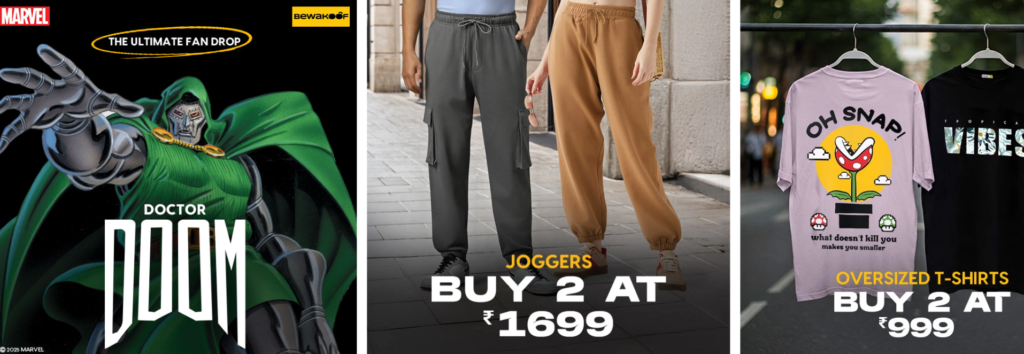Bewakoof: Be a Crore Pati just by selling T-Shirts | Success Story

Introduction
Bewakoof is not merely a fashion brand; it’s a statement. With its off-beat, young, and quirky designs, Bewakoof has made its mark in the casual wear segment of India. From graphic T-shirts printed with pop culture motifs to innovative social media campaigns, the brand is a master of mixing style and humor. What sets Bewakoof apart? Let’s peep into the journey, strategies, and success story of this style-savvy brand.
The Bewakoof Story: How a Brand Was Born of Innovation
Prabhkiran Singh and Siddharth Munot started Bewakoof in 2012. It was a passion venture at first with a vision to provide funky, affordable, and expressive fashion to young India. Even the name—’Bewakoof’ or ‘foolish’ in Hindi—was picked to be the antithesis of what’s traditional and to embrace one’s uniqueness. This no-holds-barred, tongue-in-cheek approach befriended millennials and Gen Z, and the company soon took off.
How Bewakoof Became a Pioneer of Casual Wear
Bewakoof never manufactured clothing; it revolutionized it. Bringing together comfort with pop culture-endorsed prints gave the brand a nodal spot in being the go-to brand for both youths and fashion connoisseurs alike. Be it a plain graphic T-shirt or an awesome tee hoodie statement, anything and everything is a statement of personality and thus creates fashion chic and collaborative.
Knowing Bewakoof’s Target Segment
Bewakoof is appealing to Gen Z and millennials, who are addicted to humor, memes, and self-expression. By leveraging internet culture, trends, and youth-generated content, the brand remains cool, and thus it is a trendy and cool option for young consumers.

Bewakoof’s Sustainability and Ethical Fashion Approach
In a world where sustainability is taking center stage, Bewakoof has transitioned to go green. The brand has launched organic cotton lines, minimized plastic in packaging, and embraced ethical sourcing of materials. By merging style with sustainability, Bewakoof appeals to aware consumers who wish to make conscious fashion decisions.
Bewakoof’s Different Business Model: Direct-to-Consumer (D2C) Success
Unlike other fashion companies that depend on middlemen retailers, Bewakoof is a Direct-to-Consumer (D2C) company. This enables the company to offer quality with affordability in terms of price. By doing away with the intermediaries, Bewakoof is able to give customers a seamless buying experience.
Bewakoof and the Power of Social Media Marketing
Social media has transformed Bewakoof. From viral campaigns to memes, the brand has managed to coexist with their people. On Instagram, Facebook, and Twitter, Bewakoof is not selling clothes but experiences, having fun and engaging their people.
The Impact of Influencer Collaborations
Bewakoof has partnered with influencers, content creators, and social media influencers to popularize its brand. These partnerships bring authenticity and connectability that make the brand trendy among young people.
How Bewakoof stands out in a competitive market
The market for fashion is highly competitive, yet Bewakoof has discovered a niche for itself. Where mainstream brands focus on luxury or mass-market recognition, Bewakoof focuses on the young and the quirky. The fact that it can stay on top of fashion trends, track offbeat collabs, and maintain affordable pricing provides it with a market distinction.
The Role of Limited-Edition Collections in Bewakoof’s Success
There is creation of demand through absence, and Bewakoof implements the strategy through limited collections. Pop culture licences, sports brands, and digital influencers drive the collaborations, which are the drivers of hype and urgency in consumers. Limited collections force customers to come back for more, thereby ensuring brand loyalty.
Bewakoof’s Expansion Beyond Apparel
It has evolved from being a clothing line to accessories, phone cover, and even footwear. Bewakoof realizes its customers are not looking for fashion; they are looking for the entire lifestyle experience. Diversification has diversified the company’s revenues as much as its brand name.
Bewakoof’s Mobile App: A Game-Changer in E-Commerce
As mobile commerce gained traction, Bewakoof came up with its app, where shoppers could shop and browse from anywhere at any time. The app provides one-of-a-kind offers, sneak previews of collections pre-released, and an ease of use that drives customers back, ensuring loyalty.

How Bewakoof Deals with Customer Interaction and Feedback
Bewakoof is listening carefully to its customers and acting on suggestions for improvement. From introducing new sizes, variations of fabrics, or design change, the organization appreciates consumers’ feedback. This two-way communication allows it to build a strong bond with its fan culture and continue to innovate on an ongoing basis.
Challenges and Future Plans for Bewakoof
As with each brand, Bewakoof also has its share of problems, i.e., global brand rivalry, shifting buyer needs, and affordability while expanding. But the brand, being its own innovator, is sure to become larger. Expansion opportunities in the future can be for overseas markets and new products. Conclusion
Bewakoof is a company that thrives on creativity, relevance, and flexibility. It has the recipe for success of being close to customers, innovation of new and delivering excellent quality, cool merchandise at the right prices. Once the brand takes it big, its sense for fun, no-risk fashion ensures Bewakoof remains India’s favorite youth for many years to come.








